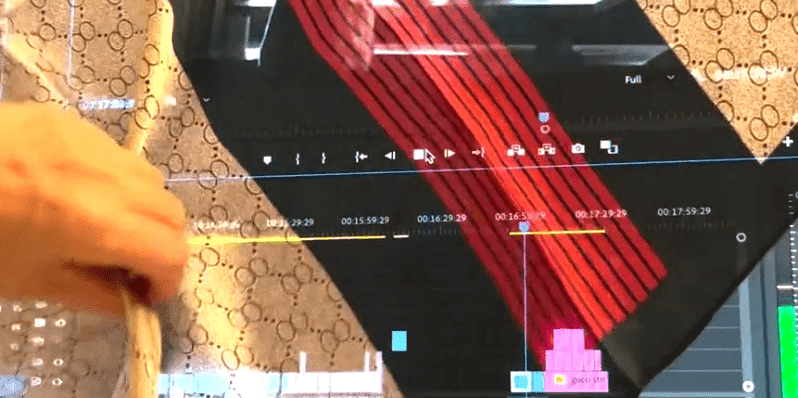
Still aus The Accented Sound of Camp (2023), Barbara Zecchi
The Accented Sound of Camp
Building on my previous research on non-traditional voiceover in videographic criticism,1 in «The Accented Sound of Camp» I use Ridley Scott's House of Gucci (2021) as a pretext to discuss the political implications of the employment of the (Italian) accent in Hollywood cinema, and to experiment with various forms of voiceover, exploring the ideological dimensions they encompass.2
My focus centers on examining the use of a fake «foreign» accent by Hollywood actors in House of Gucci. While some perceive it as mockery of Italians—or poor acting—, I argue that it deliberately aims to evoke detachment and a sense of artificiality, as a form of satire directed at those in power—the Gucci family and the fashion industry. This grotesque speech style intentionally employs camp aesthetics to critique the extravagance and affectation associated with the Gucci family. Artifice and excess, as Susan Sontag has highlighted, are key aspects of camp.3
My argument is structured into four distinct parts. In the first one, I showcase clips exemplifying linguistic stereotyping of the Italian accent in Hollywood films. I illustrate, by following Jane Hill, that mocking language spoken by marginalized groups contributes to a larger agenda of economic and social domination.4 In Part II, inspired by Alan O’Leary, I use the same clips while shifting the emphasis from their meaning to their performative dimension.5 By employing repetition and deformation, the accented Italian language is transformed into a rhythmic and melodic expression, evoking a sense of playfulness and excess, which in turn reinforces the movie’s intent to embrace distancing and defamiliarization. In Part III, I compare the original film with the Italian dubbed version. Drawing on Johannes Binotto's «Dubbing», I emphasize that the defamiliarization caused by the translation can be revealing.6 Unlike for the standard Italian used in the dubbed version—that lacks the element of mockery—, in the original film, the accent creates an artificiality reminiscent of a camp aesthetic. Finally, in Part IV, taking inspiration from Evelyn Kreutzer's voiceover in «Berlin Moves», my narration is whispered, while the images and original sounds are glitched.7 Legacy Russell suggests that glitches aren't accidental errors but can expose underlying issues such as economic disparities, racial divisions, social and gender inequalities, and the impacts of globalization.8 Likewise, in House of Gucci, the accent serves as a powerful glitch within the system, exposing the fashion industry’s abuses and excesses.
In turn, through a variation of registers, tones, and voices, my voiceover challenges conventional norms and celebrates artifice and irony, with the goal to defamiliarize the «too much» (as Adrian Martin would call it) of the traditional (academic) narration.9 It therefore performs another kind of ‹too much›: the excessive, subversive, and destabilizing (i.e. accented) sound of camp.10
- 1See my video essays «What is an Accented Video Essay? Who has the authority to speak?», (vimeo.com/523317867), «Empowering the Accent: an (accented) video essay» (vimeo.com/680718777), and the more recent «An Accented Video Way of Thinking» (vimeo.com/815797007).
- 2House of Gucci, Dir.: Ridley Scott, USA 2021.
- 3Cf. Susan Sontag: Notes on Camp, London, UK: Penguin Books 2018.
- 4Cf. Jane H. Hill: Hasta La Vista, Baby: Anglo Spanish in the American Southwest, in: Critique of Anthropology, 1993, 13.2, 145–176, https://doi.org/10.1177/0308275X9301300203. See also Jacqueline Urla: Reclaiming Basque: Language, Nation and Cultural Activism, Reno, NV: University of Nevada Press 2012.
- 5Cf. Alan O’Leary: Men Shouting: A History in 7 Episodes, in: [in]Transition: Journal of Videographic Film & Moving Image Studies, 2023, 10.2.
- 6Cf. Johannes Binotto: Practices of Viewing VIII: Dubbing, 2022, https://vimeo.com/751287656.
- 7Cf. Evelyn Kreutzer: Berlin Moves, in: [in]Transition: Journal of Videographic Film & Moving Image Studies, 2018, 5.1.
- 8Cf. Legacy Russell: Glitch Feminism: A Manifesto, London and New York: Verso 2020.
- 9Cf. Adrian Martin: A Voice Too Much: The Audiovisual Essay, 2010, https://reframe.sussex.ac.uk/audiovisualessay/reflections/adrian-martin-a-voice-too-much/
- 10For a rejection of a literal reading of Susan Sontag’s statement that «camp is apolitical» see Ann Pellegrini: After Sontag: Future Notes on Camp, in: George E. Haggerty, Molly McGarry (eds.), A Companion to Lesbian, Gay, Bisexual, Transgender, and Queer Studies, Hoboken, NJ 2008, 168 – 193.
Bildquellen
Abb. Still aus The Accented Sound of Camp (2023), Barbara Zecchi
Bevorzugte Zitationsweise
Die Open-Access-Veröffentlichung erfolgt unter der Creative Commons-Lizenz CC BY-SA 4.0 DE.